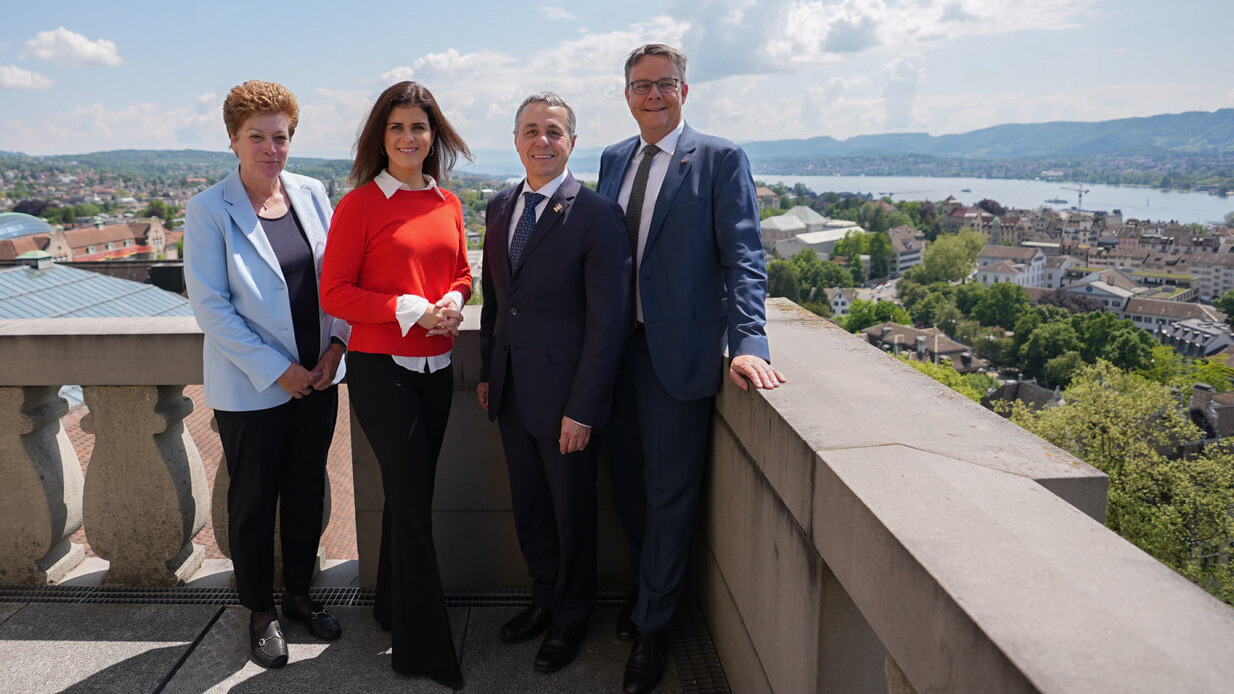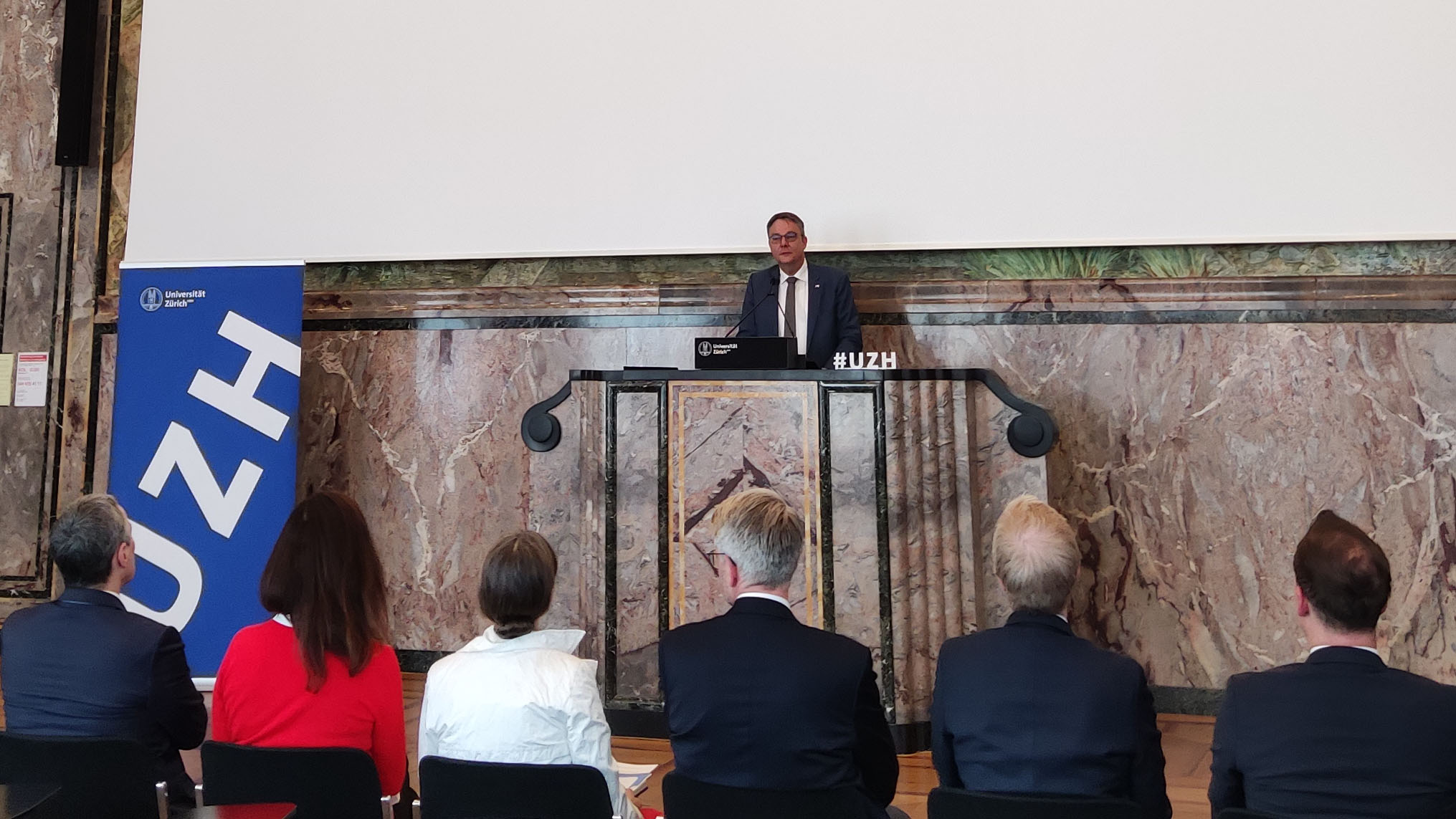Navigation auf uzh.ch
Navigation auf uzh.ch
Icelandic Foreign Minister Thórdís Kolbrún Reykfjörd Gylfadóttir recently visited the University of Zurich (UZH) for a bilateral exchange with Federal Councillor Ignazio Cassis and other Swiss representatives. UZH, known as the birthplace of the "Council of Europe" and Winston Churchill's historic Zurich Speech, was chosen as the ideal meeting location.

A delegation from the Foreign Ministry of Iceland, led by Minister for Foreign Affairs Thórdís Kolbrún Reykfjörd Gylfadóttir, engaged in a bilateral exchange with their counterparts from the Swiss Federal Department of Foreign Affairs (FDFA), headed by Federal Councillor Ignazio Cassis. The delegation was received by UZH President Michael Schaepman and Government Councillor Silvia Steiner at UZH. The exchange took place during a late lunch at the Restaurant uniTurm, offering a panoramic view of Zurich, followed by a tour of UZH's main auditorium, the "Aula”.
Picture above (from left to right): Silvia Steiner, Thórdís Kolbrún Reykfjörd Gylfadóttir, Ignazio Cassis, Michael Schaepman. Image Source: EDA
The selection of UZH as the meeting venue was not only due to its impressive architecture overlooking Zurich but primarily because it was at UZH that the idea of the "Council of Europe" and, some argue, the European Union (EU) was conceived.
On 19 September 1946, in the grand setting of UZH's main Aula, Winston Churchill, the then opposition leader and former Prime Minister of the United Kingdom, delivered a groundbreaking speech. Winston Churchill called for a union of European states following the end of World War II, concluding his speech with the memorable words "Let Europe arise!" His vision aimed to prevent a recurrence of the tragic events endured during wartime, particularly through a partnership between France and Germany, the former adversaries.
Winston Churchill's visit and the "Zurich Speech" marked a pivotal moment in European history, setting out his vision for a united Europe and ultimately leading to the creation of the "Council of Europe”. Established in 1949 as a pan-European intergovernmental organization, the Council of Europe promotes democracy, the rule of law, and, notably, human rights through the European Court of Human Rights (ECHR).
Against this backdrop, Federal Councilor Ignazio Cassis welcomed his Icelandic counterpart for a bilateral exchange focused on Iceland’s Presidency of the Council of Europe. The Presidency, soon to be handed over to Latvia, was formally concluded with the fourth-ever "Summit of Heads of State and Government of the Council of Europe" held in Reykjavik last week.
Federal Councilor Ignazio Cassis, a UZH alumnus, who received his Medical Degree at UZH in 1987 and a former visiting professor at UZH (2008-2017), discussed bilateral relations, the two countries' work in the Council of Europe, and the future path of Europe.
In addition to the challenges facing Europe as a whole and the goals of the Council of Europe, the talks focused on cooperation between Switzerland and Iceland within the framework of EFTA and cooperation on climate issues.

In his welcome remarks, UZH President Michael Schaepman stressed the historic significance of UZH and the Council of Europe as well as UZH’s strong connections to Europe over the past decades: “We are very proud to have played a part in a historic moment that inspired several important political and economic developments in post-war Europe. For even though Switzerland is not a member of the European Union, our country is an integral part of Europe – from a geographic point of view, but also regarding our cultural values. Especially in research, collaboration has always been strong and fruitful on both sides. In the spirit of a ‘united Europe’, this will hopefully be the case in the future, too.”
Professor Helen Keller, a distinguished legal expert of European and Public International Law and previous judge at the European Court of Human Rights (2011 to 2020), shared insights on the aforementioned Summit of the Council of Europe with the guests of honor. In her presentation, Professor Keller stressed the relevance of the ECRH in today’s increasingly difficult geopolitical context in Europe and beyond.
Iceland and Switzerland share various similarities: Both are wealthy and relatively small countries. They are not part of the European Union but are linked with the rest of Europe through multifaceted connections, including common membership in the Council of Europe and the European Free Trade Association (EFTA).
UZH's connections to Iceland extend beyond this visit with active research collaborations in arts, geography, biology, and medicine between UZH and the University of Iceland.
Overall, the visit showcased UZH's historical significance and its ongoing role in fostering international collaborations and promoting shared values in Europe.
Raphael Kunz